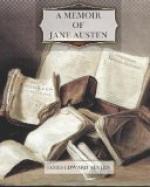words: ’Like him (Shakspeare) she shows
as admirable a discrimination in the character of fools
as of people of sense; a merit which is far from common.
To invent indeed a conversation full of wisdom or
of wit requires that the writer should himself possess
ability; but the converse does not hold good, it is
no fool that can describe fools well; and many who
have succeeded pretty well in painting superior characters
have failed in giving individuality to those weaker
ones which it is necessary to introduce in order to
give a faithful representation of real life:
they exhibit to us mere folly in the abstract, forgetting
that to the eye of the skilful naturalist the insects
on a leaf present as wide differences as exist between
the lion and the elephant. Slender, and Shallow,
and Aguecheek, as Shakspeare has painted them, though
equally fools, resemble one another no more than Richard,
and Macbeth, and Julius Caesar; and Miss Austen’s
{142} Mrs. Bennet, Mr. Rushworth, and Miss Bates are
no more alike than her Darcy, Knightley, and Edmund
Bertram. Some have complained indeed of finding
her fools too much like nature, and consequently tiresome.
There is no disputing about tastes; all we can say
is, that such critics must (whatever deference they
may outwardly pay to received opinions) find the “Merry
Wives of Windsor” and “Twelfth Night”
very tiresome; and that those who look with pleasure
at Wilkie’s pictures, or those of the Dutch
school, must admit that excellence of imitation may
confer attraction on that which would be insipid or
disagreeable in the reality. Her minuteness
of detail has also been found fault with; but even
where it produces, at the time, a degree of tediousness,
we know not whether that can justly be reckoned a
blemish, which is absolutely essential to a very high
excellence. Now it is absolutely impossible,
without this, to produce that thorough acquaintance
with the characters which is necessary to make the
reader heartily interested in them. Let any one
cut out from the “Iliad” or from Shakspeare’s
plays everything (we are far from saying that either
might not lose some parts with advantage, but let him
reject everything) which is absolutely devoid of importance
and interest in itself; and he will
find that what is left will have lost more than half
its charms. We are convinced that some writers
have diminished the effect of their works by being
scrupulous to admit nothing into them which had not
some absolute and independent merit. They have
acted like those who strip off the leaves of a fruit
tree, as being of themselves good for nothing, with
the view of securing more nourishment to the fruit,
which in fact cannot attain its full maturity and flavour
without them.’
The world, I think, has endorsed the opinion of the later writer; but it would not be fair to set down the discrepancy between the two entirely to the discredit of the former. The fact is that, in the course of the intervening five years, these works had been read and reread by many leaders in the literary world. The public taste was forming itself all this time, and ‘grew by what it fed on.’ These novels belong to a class which gain rather than lose by frequent perusals, and it is probable that each Reviewer represented fairly enough the prevailing opinions of readers in the year when each wrote.




